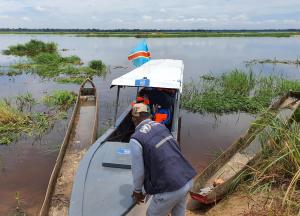WHO expands field response capacity to curb mpox in Democratic Republic of the Congo
Kinshasa – More than 300 World Health Organization (WHO) disease surveillance and outbreak response experts supporting the polio eradication efforts in the Democratic Republic of the Congo have been integrated into mpox outbreak control efforts as WHO scales up support to the country to effectively address the ongoing public health emergency.
“The Polio Eradication Programme has been at the forefront of disease surveillance in communities. The lessons we’ve learnt from this programme coupled with the expertise of our immunization and polio workers in identifying at-risk groups and engaging communities will be instrumental in the efforts to halt the spread of the mpox,” said Dr Matshidiso Moeti, WHO Regional Director for Africa.
The experts have extensive field experience in public health, particularly in community-based and health-facility active surveillance, case investigations, contact tracing and risk communication, and have been at the forefront in the fight against polio and other vaccine-preventable diseases.
In 2023 and 2024 they played a key role in supporting the Democratic Republic of the Congo’s successful implementation of nationwide polio vaccination campaign, targeting more than 25 million children in just three days. These efforts have brought down the incidence of polio by more than 90%.
“Our experience in managing infectious diseases and our deep integration within the communities we serve make us a vital part of the ongoing mpox response,” says Dr Jean-Blaise Iyala, among the more than 300 polio responders deployed in the country’s northern Bas-Uélé province. “Disease surveillance has been crucial in swiftly identifying and managing mpox cases nationwide, just as it has been for polio in the past.”
Mpox has been detected in 15 African countries so far this year. The Democratic Republic of the Congo accounts for 90% of all cases, with more than 21 000 suspected cases and 700 deaths reported to date this year.
The Democratic Republic of the Congo has received more than 200 000 mpox vaccine doses. WHO and partner organizations are supporting the national authorities to ensure preparedness for an effective rollout of the vaccine.
Targeted vaccination can help reduce the spread of the virus by breaking chains of infection. WHO is also assisting the Democratic Republic of the Congo and other affected countries prepare for vaccine deployment by developing cold-chain systems for vaccine storage and transport; testing, contact tracing and capacity building; and developing mechanisms to tackle misinformation.
In addition, WHO is working with partners like Gavi, the Vaccine Alliance, and UNICEF, through the interim medical countermeasures network, to enable urgently needed vaccine donations from countries with existing stockpiles.
Mpox is a viral illness caused by the monkeypox virus. It spreads between people, mainly through close physical contact. While most people fully recover, the disease can be fatal. Children, pregnant women and individuals with weakened immune systems such as people living with HIV face greater risk of infection.
Communications Officer
WHO DRC
Tel : +243 81 715 1697
Office : +47 241 39 027
Email: kabambie [at] who.int (kabambie[at]who[dot]int)
Communications and marketing officer
Tel: + 242 06 520 65 65 (WhatsApp)
Email: boakyeagyemangc [at] who.int (boakyeagyemangc[at]who[dot]int)



